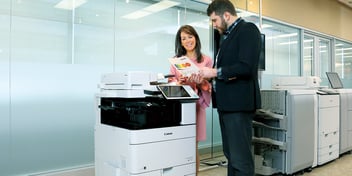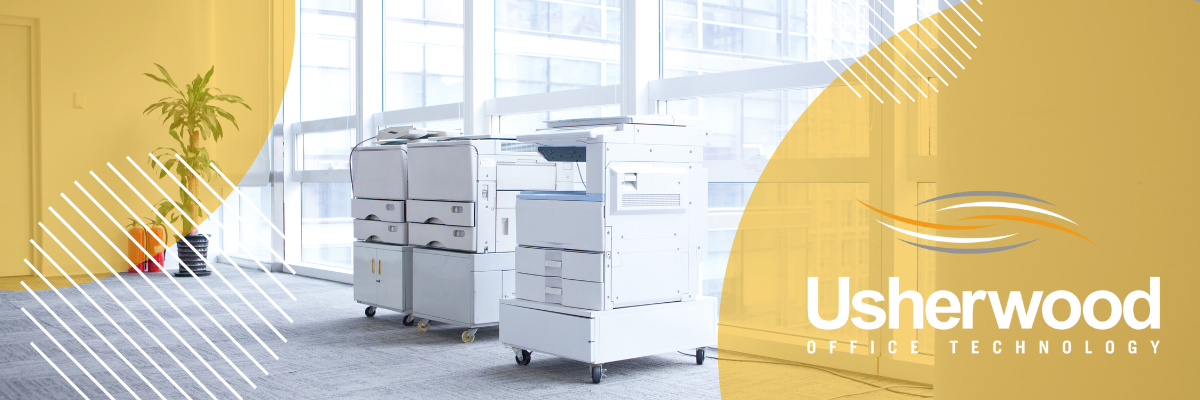By: Jada Sterling, Digital Content Manager on December 8th, 2023
How Do I Get Out of My Copier Lease?
In today’s economy, it’s harder than ever to remain profitable and manage budgets for any business. This means you probably aren’t focusing the majority of your attention on expenses like office equipment. However, like any business decision, you should weigh the costs and benefits of every asset and service you’re paying for.
If you already lease a copier or are considering leasing one, it’s crucial to be informed about your options. Here’s a breakdown of what to expect when you sign on to a printer or copier lease, and typical policies of copier leasing companies.
Should You Lease a Copier?
A common sentiment among business owners is that if an asset depreciates, you should lease it instead of buying it. This is especially true for devices that have very little resale value.
Copiers are no exception. This is because updates to firmware for cybersecurity and other emerging technologies can often leave older models obsolete.
The argument for buying equipment is mostly centered on flexibility and pricing. When you buy a copier, you don’t have to pay interest, and you aren’t locked into any payment contracts. This is ideal if you need flexibility, or if you’re unsure about committing to a managed print provider.
Overall, however, at the end of your copier’s lifecycle, you will likely get very little if you’re even able to resell the machine. As another frustration, you’ll have to dispose of the equipment yourself instead of turning it in for a new device.
You will also typically find that as a machine ages, the frequency of service needs go up too so you might not actually end up saving money by holding onto an already paid-for machine if the service costs are too high.
Buying is also not a great idea if you’re not comfortable with large upfront costs, which contrasts to the lower, spread-out payments with a copier lease. If you want to learn more about the pros and cons of a copier lease vs buying, read our blog: To Lease or Not To Lease: Here Are Your Options When Your Copier Lease Ends (usherwood.com)
How Do Copy Machine Leases Work?
If you’ve decided to lease a copier, you should understand how copier lease agreements work. Only then can you have full confidence in committing to a device, and evaluating your options for printer lease companies
Leasing Terms
Lease terms will most often be three to five years in length. They will also automatically renew if you don’t opt out of renewal. It’s important to ask your managed print provider about their process for renewal.
Some might not notify you far enough in advance if your lease is about to be renewed, and it's easy to miss these messages. This is important as leases will be automatically renewed once the initial term is expired unless you opt-out.
Although copier lease contracts might contain language for a renewal opt-out timeframe, a good print provider will also make sure you get the message with ample time to decide before getting stuck in a renewal period. Depending on the contract, you could find yourself locked into a month-long, quarterly, or year-long renewal.
Associated Fees
It’s easy for fees to slip through the cracks when you’re running a business. With all the other expenses coming out of your account, you may not notice the pesky fees associated with your copier. However, managing these fees will be a lot easier with the help of an experienced print provider. They will be able to catch these things, such as property insurance fees, that are tacked on automatically.
There are services like this that are simply not necessary depending on your circumstances. If you don’t have a dedicated team of print experts keeping a sharp eye on them, you may end up paying more than you need to each month.
Typical Leasing Policies & Practices
Copier machine leasing companies will typically require you to contact them directly within a given timeframe to cancel a copier lease renewal. This is an important detail, since just letting your print provider know is not enough.
If you want to return equipment early, the best managed print services will negotiate on your behalf to help you. Still, ultimately you must be aware of the leasing company’s policies above all.
Most lease agreements are concrete, and if you sign on for a given number of payments, you must pay them.
Types of Leases
Not all copier leases look the same. There are a few types of leases you will typically see, and here’s a summary of the two main types.
FMV
Fair Market Value (or FMV) leases are the most common type of copier lease. These will allow lessees to choose between returning and buying the equipment at the end of the lease term for the depreciated cost of the machine. These tend to be less expensive than $1 buyout leases.
Since equipment rarely retains substantial value by the end of the lease term, many lessees will exchange their old devices for new leased ones anyway. For this reason, FMV leases are a popular office copier lease option.
$1 Buyout
Many copier machine leasing companies will also offer a $1 buyout option. These leases tend to have higher monthly payments, but at the end of the term, you can purchase the equipment for just $1. This is ideal if you want to own the asset at the end. However, due to the higher payments and lack of retained value, many businesses will opt to lease another new device anyway and return their equipment.
Can You Get Out of a Copier Lease?
The answer to this question is: it’s complicated. Whether you can get out of a lease will depend on the terms and conditions of your lease agreement. Above all, if you sign on to a copier lease, you should be aware of the policies of the leasing company. Most likely, you will need to fulfill your contractual obligations and make all payments stated in your lease.
However, having a good print provider to advocate on your behalf will make a substantial difference. A good managed print provider will make sure you’re not missing any hidden fees or deadlines that could end up costing you in the long run. They might also help you find options if you’re certain that you want to return equipment early.
Competitor Company Lease Buyouts
Sometimes, competitors who want your business will pay for a lease buyout to get you to sign on with a new lease.
This will not always happen, so you should definitely not expect this to be on the table when negotiating with a print provider. However, it does happen. In which case, that company would pay off the remaining cost of your lease, and you would have the ability to sign a new lease agreement with that competitor.
Keep in mind that when a competitor buys out your lease, they will expect you to pay off the cost of the buyout over the term of your new lease. They might be leveraging manufacturer promotions, or even accepting a lower margin for the sake of bringing you on as a new client. They may be using all three of these strategies at once.
How To Lease a Copier
If you’re ready to dive in and lease a copier, make sure to research different print providers. This is a crucial step in getting a good deal, since the transparency of your managed print service can make or break your experience.
Look for honest sales reps who care about getting you the right device within your budget that fits your business goals. They should also be well-versed on lease agreements, and able to provide ongoing support and clear explanations of the terms and conditions of your contract.
To speak with an experienced copier and print expert, click the button below to get a print assessment and start your journey.
Read On

To Lease or Not To Lease: Here Are Your Options When Your Copier Lease Ends
If you're coming up on the end of your business copier lease, you might wonder, "What do I do now?"...

Leasing vs Purchasing Copiers; which is right for your business?
Imagine you purchase a copier costing $10,000 for your business. It's perfect for the focus of your...

Should You Purchase or Lease Your Office Technology?
When you're exploring cost-effective solutions for your office solutions, it might be confusing...



